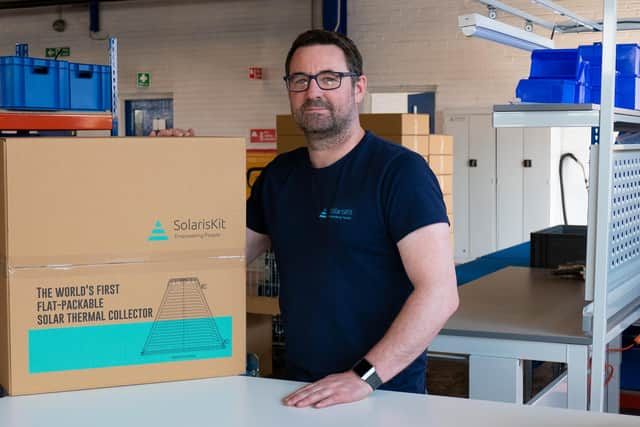Dundee start-up fires up production of Rwanda-focused solar power device
and live on Freeview channel 276
The move by SolarisKit, which is behind what it says is one of the easiest and cheapest solar thermal collectors in existence to install, comes after it graduated from Royal Bank of Scotland’s (RBS) Climate Entrepreneur Accelerator Programme.
The start-up was formed in 2019 by mechanical engineer Dr Faisal Ghani after he read about energy usage in Rwanda, where a large portion of household income is required to cover heating bills.
Advertisement
Hide AdAdvertisement
Hide AdHe knew the country could harness its solar energy in an “affordable, practical” way to heat water – inspiring the creation of the S200 flat-packable solar thermal collector.


Now, 80 units of the S200 have been shipped to Rwanda, with product trials set to begin in June, involving seven households and two hotels.
Former Heriot-Watt University academic Dr Ghani says the accelerator enabled the burgeoning firm to establish a commercial plan, network, and find investors to back the product.
RBS said that as principal partner of the COP26 conference in Glasgow, it recently relaunched the accelerator with a climate focus – saying the digital, three-month programme underlines its commitment to its own climate change goals,.
Advertisement
Hide AdAdvertisement
Hide AdThe lender has also established a corporate partnership with SolarisKit, becoming its first UK customer, with plans in place to install the thermal collector at its Gogarburn HQ in Edinburgh.
The six-strong team behind SolarisKit is also exploring the possibility of supporting rural communities in India, and Dr Ghani hopes to grow the company in the coming months. Currently, the firm has the capacity to produce 20,000 kits a year, with ambitions to reduce global carbon emissions by one billion kilogrammes in just five years.
Dr Ghani, who is also the CEO of SolarisKit, said: “As a new father, I became more aware of our need to tackle the climate emergency and felt I could do more as an entrepreneur than academic. After realising that carbon emissions from the developing and emerging economies exceeded those produced by the industrialised nations, I was motivated to make a change.”
A message from the Editor:
Thank you for reading this article. We're more reliant on your support than ever as the shift in consumer habits brought about by coronavirus impacts our advertisers.
If you haven't already, please consider supporting our trusted, fact-checked journalism by taking out a digital subscription.
Comment Guidelines
National World encourages reader discussion on our stories. User feedback, insights and back-and-forth exchanges add a rich layer of context to reporting. Please review our Community Guidelines before commenting.
